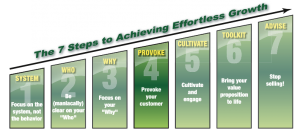 One of my favorite movies is Glengary Glenn Ross (based on David Mamet’s play). In it, the most down-on-his-luck salesman (played by Jack Lemmon) gets up to grab a cup of coffee. The salesman visiting to share his "motivational speech" (played by Alec Baldwin) pounces on him mercilessly, shouting, “Put that coffee down! Coffee’s for closers!”
One of my favorite movies is Glengary Glenn Ross (based on David Mamet’s play). In it, the most down-on-his-luck salesman (played by Jack Lemmon) gets up to grab a cup of coffee. The salesman visiting to share his "motivational speech" (played by Alec Baldwin) pounces on him mercilessly, shouting, “Put that coffee down! Coffee’s for closers!”
That one line captures the essence of the sales culture, both as we have come to know it and, too frequently, how we manage it. We still think of “sales” and the star salesperson as the one who “closes the deal,” and gets to “eat what he kills.”Getting a prospect to get across the finish line by making a decision is important. Creating the environment that enables you to stand out from your competition and influencing your prospect’s decision criteria is critical to increasing win rates and protecting margins.
If you want to enter what I like to call, what’s it worth conversations (as opposed to what’s it cost), you must first change how your prospects thinks about the issues you address. And, this occurs long before you’re in a position to close business. Studies show that if you do a good job with this provocation process, the difficulty associated with closing business virtually disappears.
Provoking effectively requires that your marketing and sales efforts work together in alignment. Your website, collateral and case studies must move beyond the typical brochure type “we-do’s” that make the same types of claims your competitors make. You marketing must engage, challenge and educate.
Your sales efforts must pick up on this teaching point-of-view and move beyond the same old open-ended questions to questions the provoke deeper thought and educates your prospects (and customers) on their business. Your sales team must become businesspeople-who-sell.
It’s not as easy as awarding a Cadillac to your top closers, but you’ll find that it’s a lot more profitable.

 Doug Davidoff
Doug Davidoff